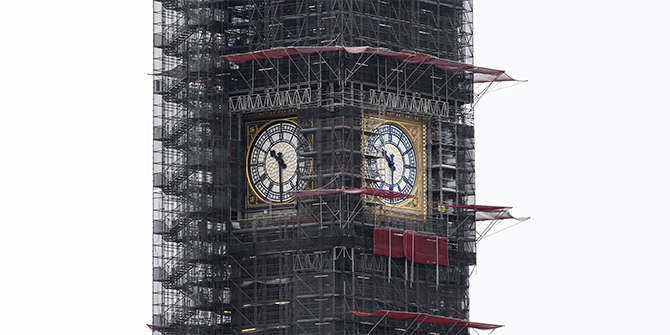 David Judge writes that, while much of the discussion around Brexit and Parliament is about procedure and conventions, it should also be about the bigger picture: what does Brexit tell us about the fundamental principles of the UK’s parliamentary state and representative democracy?
David Judge writes that, while much of the discussion around Brexit and Parliament is about procedure and conventions, it should also be about the bigger picture: what does Brexit tell us about the fundamental principles of the UK’s parliamentary state and representative democracy?
Politicians and the punditocracy have become consumed with the minutiae of parliamentary procedure and constitutional conventions – of the use of standing orders, the provisions of the Fixed-Term Parliaments Act in relation to a no-confidence vote and its consequences, and the potential spill-over embroilment of the judiciary and the monarchy – as the ‘do or die’ Brexit strategy of Boris Johnson’s government appears to replicate the on-board conditions of a nose-diving plane. Assuming, however, that whatever happens after 31 October 2019, the UK ‘plane’ will land somewhere, then perhaps what we need to be thinking about right now is not only how we respond to the immediate emergency but how we understand what’s happening in light of the fundamental principles of the UK’s parliamentary state and representative democracy’.
Parliamentary democracy: the official version
The UK is a parliamentary state. Officially it is designated as ‘a parliamentary democracy’. This official ‘standard account’ sees the UK as a variant of representative democracy; and deems state decision-makers to be both representative of and responsible to ‘the people’ through the process of elections. More specifically, in this UK variant, parliament is identified as the state’s primary representative institution and is deemed to exercise legal sovereignty.
Threaded through this account are assumptions about legitimacy, authorisation, accountability and control. These are not merely normative assumptions, as historically the UK parliament has fused the principle of consent with that of representation and has served to legitimate government and its activities. It is this idea of the parliamentary legitimation of government that has been of historic importance, and is now crucial to understanding what is happening with Brexit.
Basic principles of parliamentary democracy
As a representative institution, parliament is embedded in a process of making present the interests and views of citizens who are not physically present at the point of decision. Representative democracy does not assume a homogeneous ‘demos/people’, or a pre-given ‘general will’, instead it assumes permanent contestation and the representation of diverse social interests and opinions. As a process of adjudicating amongst, and reconciling, conflicting claims parliamentary democracy assumes the articulation of some common interest; and provides, through electoral processes and representative institutions, a capacity for communal judgement of that articulation. It is a dialectic process of authorisation and accountability.
Ultimately, therefore, there is a ‘democratic bargain’ at the heart of parliamentary democracy that seeks to fashion, out of this diversity and contestation, ‘winners who are willing to ensure that losers are not too unhappy and for losers, in exchange, to extend their consent to the winners’ right to rule’.
Legitimation frame of Westminster
There is no disputing that the historic practice of parliamentary democracy in the UK has privileged the imperatives of government and executive independence over the doctrine of ministerial accountability and responsibility to parliament. As a result, the normative logic of the doctrine has effectively been inverted, with parliament having to seek, through successive reform initiatives, to ‘reinvert’ – or more idealistically still to ‘revert’ – to a more favourable balance between executive and legislature in order to lever greater executive accountability and responsibility.
Yet, in these attempts, parliament has been confronted by an ‘executive mentality’ wherein governments are predisposed to undervalue the requirements and culture of transparency and parliamentary control when formulating and implementing their policies. Nonetheless, the very same governments have defined, shaped and legitimised their behaviour in terms of parliamentary sovereignty and parliamentary representation. This ideational frame posits a parliamentary-centric vision to justify an executive-centric mode of decision-making. And, so, embeds within the UK state an elemental ‘democratic incongruity’.
Notions of legitimacy: input, throughput, and output
At its simplest, legitimate power can be conceived as ‘power that is rightful’. A distinction has long been made between political legitimacy derived from participatory inputs (primarily conceived in the UK in terms of democratic elections and electoral representation) and performance-related outputs (often conceived in terms of the efficacy of state decision-makers in producing policies to promote socio-economic well-being and maintain the stability and territorial integrity of the state itself; or, in the case of the Johnson government simply getting Brexit ‘done’).
Yet, what happens in the space between political input and policy output is also of vital significance in any state, and constitutes a third dimension of legitimacy This is what Vivien Schmidt identifies as ‘throughput legitimacy’. Her basic contention is that ‘the quality of the governance processes, and not only the effectiveness of the outcomes and the participation of the citizenry, is an important criterion for the evaluation of a polity’s overall democratic legitimacy’.
This process-oriented focus is of direct relevance to the understanding of the significance of the UK parliament. Simply stated, parliament provides for the (macro, system-wide) institutionalisation of ‘throughput’ legitimation. In fact, Schmidt’s notion is epitomised in the institutionalised processes of deliberation, scrutiny, contestability, and accountability – with their associated elaborate procedures, rituals and symbols – which are embedded in Westminster’s contributions to state decision-making processes. While all modern UK governments, pre-2016, might have sought the practical circumvention of these processes, nonetheless, they all acknowledged their normative centrality to the legitimation of their actions.
So, what should we be thinking about?
It might be politically expedient in the short term for a government to seek to avoid scrutiny, or to try to side-step the ‘the trial of discussion’ in parliament, for example, by proroguing parliament, or controlling the parliamentary time-table to ‘run out the clock’ before 31 October. Ultimately, in the longer term, such tactics may well come back to haunt such a government, by undermining the very ‘throughput’ legitimation claims upon which its authority is based.
Any government that claims that parliament is seeking to ‘block’ Brexit, to frustrate the will of ‘the people’ as expressed in the 2016 referendum, and is, therefore, unrepresentative of ‘the people’, is challenging a fundamental principle of parliamentary democracy. The assertion of a mythical single, unified collectivity of ‘the people’ runs counter to the essence of parliamentary democracy. In such a system MPs represent the ‘political nation’ (however constituted in any political period) and its many differences and divisions; and, in the specific case of Brexit, parliament registers the Richter magnitude of the post-referendum fault-lines now fragmenting families, constituencies, political parties and nations in the UK.
The countenancing of an election strategy based upon ‘parliament versus the people’ is neither smart electoral politics nor a smart governing strategy for a government that will still be subject to the basic logic of parliamentary legitimation of executive actions. Should such a strategy be pursued, however, it might prompt those who recognise a ‘present and serious danger’ to parliamentary democracy to explain, far more actively, what parliament ‘is’ and ‘does’ (and why it is often difficult for parliamentarians themselves to defend the institution of parliament).
______________
 David Judge is Professor Emeritus of Politics at the University of Strathclyde.
David Judge is Professor Emeritus of Politics at the University of Strathclyde.
All articles posted on this blog give the views of the author(s), and not the position of LSE British Politics and Policy, nor of the London School of Economics and Political Science. Featured image credit: Pixabay (Public Domain).








3 Comments